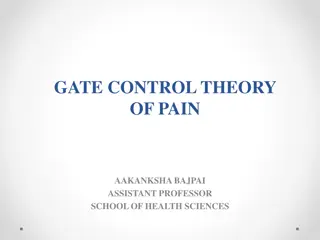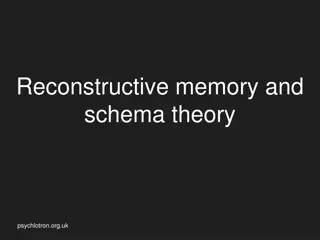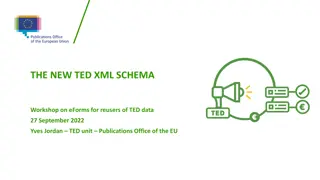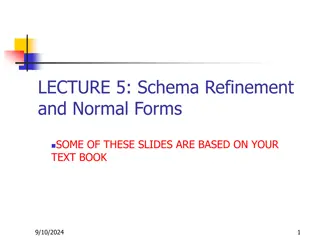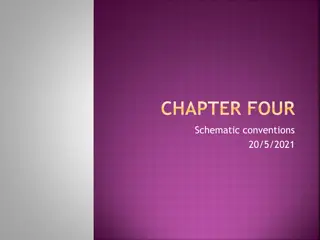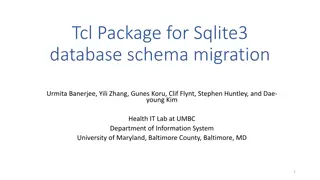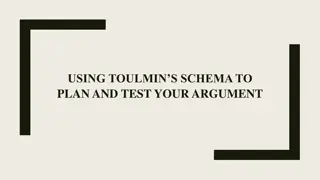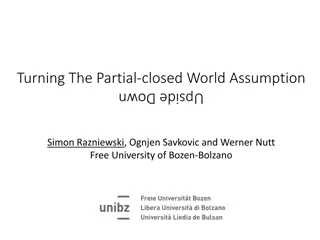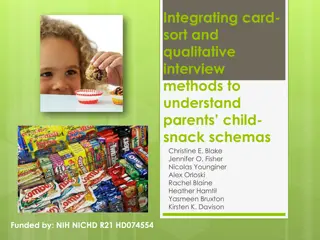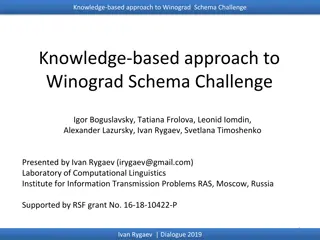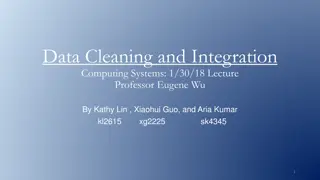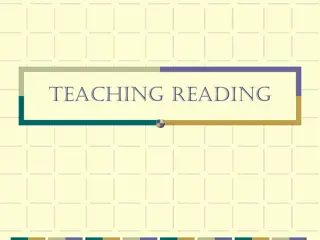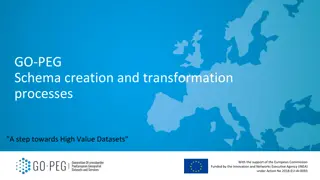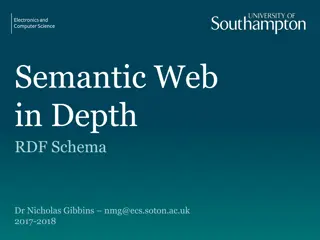Ginzburg Landau phenomenological Theory
The Ginzburg-Landau phenomenological theory explains superconductivity and superfluidity as distinct thermodynamic phases. It focuses on phase transitions characterized by singularities in specific heat at the transition temperature. Derived from BCS theory, it quantifies condensation energy, emphas
1 views • 38 slides
Crystal Field Theory in Transition Metal Complexes
Crystal Field Theory (CFT) explains the colors and magnetic properties of transition metal complexes. It focuses on the energy changes in d-orbitals of metal ions caused by surrounding ligands. This theory, developed in 1929, provides insights into the bonding interactions in complex compounds. The
10 views • 44 slides
Understanding Social Learning Theory and the Power of Example
Social Learning Theory, introduced by Bandura, emphasizes learning through observation and modeling. It explores how individuals acquire behavioral dispositions, trial-and-error experiences, and the impact of stimuli in the environment. The theory focuses on the importance of attention, retention, a
1 views • 17 slides
Evolution of Mathematical Theories and Proof Systems
Development of mathematical theories such as model theory, proof theory, set theory, recursion theory, and computational complexity is discussed, starting from historical perspectives with Dedekind and Peano to Godel's theorems, recursion theory's golden age in the 1930s, and advancements in proof t
1 views • 29 slides
Introduction to Organizational Behavior: Management Theories and Practices
Explore the evolution of organizational behavior from early management theories to contemporary practices. Understand the historical foundations and relevance of management theory in shaping workplace dynamics. Delve into key concepts like Scientific Management, Administrative Management, Bureaucrat
1 views • 28 slides
Theories on the Origin of State: Divine, Force, Patriarchal, and More
Various theories such as Divine Origin, Force Theory, Patriarchal Theory, and others explain the origin of the state. Divine theories attribute state creation to God, while Force Theory emphasizes the strong subjugating the weak to establish authority. Each theory offers unique perspectives on the h
1 views • 24 slides
Understanding Forgetting: Theories and Influence on Memory Recall
Forgetting is a complex phenomenon influenced by theories such as Decay Theory, Interference Theory, and Motivated Forgetting. The Ebbinghaus forgetting curve highlights how memories fade over time. Decay Theory suggests memories decay over time, while Interference Theory explains how old and new me
0 views • 25 slides
Psychological Theories of Criminality: Understanding the Roots
Psychological theories of criminality delve into the association between intelligence, personality, learning, and criminal behavior. Major theories include Psychodynamic Theory by Freud, Behavioral Theory by Bandura, and Cognitive Theory by Kohlberg. These theories explore how unconscious mental pro
1 views • 20 slides
MongoDB vs. Relational Databases: Myth vs. Reality in NoSQL Design
MongoDB is a document-oriented database that challenges traditional relational databases by offering flexible schema designs. While myths suggest no need for schema design or relationships in MongoDB, the reality emphasizes the importance of thoughtful schema design and choice in data relationships.
2 views • 21 slides
Austin's Theory of Law by Rinkey Sharma: An Overview
Austin's Theory of Law, presented by Rinkey Sharma, delves into the Imperative Theory of Law as proposed by Austin, known as the father of English jurisprudence. It explores General and Particular Jurisprudence, Austin's definition of law, and the elements of positive law, emphasizing the concepts o
0 views • 11 slides
Theories of International Relations Overview
The field of International Relations (IR) encompasses various theories that seek to explain global phenomena, drawing from disciplines like history, philosophy, and economics. Theory, derived from contemplation and speculation, organizes ideas to explain issues such as state emergence, conflict caus
1 views • 47 slides
Understanding the Gate Control Theory of Pain in Pain Management
This detailed content delves into the Gate Control Theory of Pain, explaining pain pathways involving nociceptors, A-delta fibers, and C fibers. It further explores central pain pathways like the spinothalamic tract, spinomesencephalic tract, and spinoreticular tract. The theory's mechanism of pain
3 views • 11 slides
Understanding the Theory of Firms: Neoclassical vs. Modern Approaches
The theory of firms is explored through the Neoclassical and Modern perspectives. Neoclassical theory focuses on profit maximization, while Modern theory delves into managerial, principal-agent, and transaction cost theories. The discussion covers criticisms of Neoclassical theory and the essential
1 views • 79 slides
Understanding Reconstructive Memory and Schema Theory in Psychology
Explore the concepts of reconstructive memory and schema theory in psychology, delving into how encoding, storing, and retrieving information in long-term memory can lead to alterations based on our stored knowledge and experiences. Discover how schemas influence our interpretation of events, impact
0 views • 9 slides
Theories of Causation in Psychological and Social Sciences
Overview of theories of causation categorized into psychological, social psychological, and sociological perspectives. Psychological theories focus on instinctive, biological, and psychological qualities of abusers, including Attachment Theory, Psychodynamic Theory, Social Learning Theory, and Situa
0 views • 15 slides
Understanding Political Theory through a Contextual Approach
Exploring G.H. Sabine's perspective on political theory through a contextual approach, emphasizing the importance of historical context and societal influences. Sabine argues that while political theory evolves with its contemporary politics, it should be analyzed within its specific time and social
0 views • 9 slides
Evolution of Light Theory: From Wave Theory to Quantum Theory
At the turn of the century, the discovery of the photoelectric effect challenged the wave theory of light, leading to the development of the quantum theory by Max Planck and Albert Einstein. This new theory introduced the concept of discrete energy units known as quanta, bridging the gap between wav
1 views • 62 slides
Workshop on eForms for Reusers of TED Data: New XML Schema Insights
Delve into the latest TED XML schema developments at the workshop, exploring challenges, benefits for re-users, available resources, and more. Learn about new concepts, rules, and the OASIS Universal Business Language standard. Discover how tailoring extensions and balance enhance stability and flex
0 views • 10 slides
Dp-branes, NS5-branes, U-duality, and M-Theory Overview
Overview of Dp-branes, NS5-branes, and U-duality derived from nonabelian (2,0) theory with Lie 3-algebra. Introduction to M-theory, including M2-branes and M5-branes in the strong coupling limit. Discussion on BLG theory, Lorentzian Lie 3-algebra, and the ABJM theory for M2-branes.
1 views • 32 slides
Database Schema Refinement and Normal Forms Explained
Explore the concept of schema refinement and normal forms in database management. Understand issues like insertion, deletion, and update anomalies in database tables. Learn about set-valued attributes and their implications in designing databases for tracking customer transactions.
2 views • 69 slides
Understanding Time-Independent Perturbation Theory in Quantum Mechanics
Perturbation theory is a powerful tool in solving complex physical and mathematical problems approximately by adjusting solutions from a related problem with known solutions. This theory allows for more accurate approximate solutions by treating the difference as a small perturbation. An example inv
0 views • 19 slides
Ethical Theories: Divine Command vs. Virtue Theory Explained
Divine Command Theory asserts that morality is derived from God's commands, contrasting with Virtue Theory which focuses on developing moral virtues to achieve human flourishing and excellence. Divine Command Theory relies on religious texts, while Virtue Theory emphasizes the cultivation of virtues
0 views • 24 slides
Understanding Fermi Liquid Theory in Interacting Fermion Systems
Fermi liquid theory, also known as Landau-Fermi liquid theory, is a theoretical model that describes the normal state of metals at low temperatures. Introduced by Landau and further developed by Abrikosov and Khalatnikov, this theory explains the similarities and differences between interacting ferm
0 views • 23 slides
Extended Schema for School Year 2015: PowerSchool TSDL Requirements
The PowerSchool Teacher-Student Data Link (TSDL) Extended Schema for School Year 2015 outlines various design details, setup instructions, and error resolutions related to course setup, grading scales, virtual delivery, and staff management. The document provides valuable insights and guidelines for
0 views • 20 slides
Computational Learning Theory: An Overview
Computational Learning Theory explores inductive learning algorithms that generate hypotheses from training sets, emphasizing the uncertainty of generalization. The theory introduces probabilities to measure correctness and certainty, addressing challenges in learning hidden concepts. Through exampl
0 views • 43 slides
Automata Theory and Theory of Computation Overview
This course overview covers concepts in automata theory and theory of computation, including formal language classes, grammars, recognizers, theorems in automata theory, decidability, and intractability of computational problems. The Chomsky hierarchy, interplay between computing components, modern-
0 views • 42 slides
Understanding Schema Theory: A Guide to Mental Representations
Schema theory in social science refers to the mental structures individuals use to organize knowledge and guide cognitive processes. This theory, prevalent in the 1980s, aids in interpreting and predicting the world by categorizing objects and events based on common elements. Schema theory in lingui
0 views • 20 slides
Tcl Package for SQLite3 Database Schema Migration
A Tcl package was developed to support schema migration in SQLite3 databases, enabling incremental or reversal changes to relational database schemas. The package includes functions for fundamental database operations like table creation, deletion, column addition, removal, and table renaming. By ge
0 views • 15 slides
Theories of Interest in Microeconomics II
Explore various theories of interest in economics, including the Classical Theory, Liquidity Preference Theory by Keynes, Productivity Theory, Abstinence Theory, Time-Preference Theory, Fisher's Time Preference Theory, and the Loanable Fund Theory. These theories offer different perspectives on the
0 views • 6 slides
Exploring the Evolution of Atomic Theory
Delve into the historical journey of atomic theory starting from Democritus and Aristotle's views to modern advancements proving some aspects of Dalton's theory incorrect. Learn about key laws and theories such as the Particle Theory of Matter, Dalton's Atomic Theory, and JJ Thomson's discoveries, s
0 views • 30 slides
Using Toulmin's Schema to Plan Effective Arguments
Explore how Carmen applies Toulmin's schema to craft a compelling argument about the benefits of girls playing first-person-shooter video games. Her reasoning, grounded in personal experiences and societal perceptions, demonstrates the intricate planning required to support each claim effectively. B
0 views • 10 slides
Modeling Complete and Incomplete Data in Database Systems
The discussion revolves around the partial-closed world assumption, contrasting incompleteness as default (IAD) with completeness as default (CAD). It delves into querying completeness reasoning, translating between CAD and IAD, and the implications of using IAD over CAD in database modeling. Variou
0 views • 13 slides
Understanding Parents' Child Snack Schemas Through Mixed Methods
This study explores parents' perspectives on child snacking behaviors using a mix of qualitative interviews and card-sorting tasks integrated with cognitive schema theory. By analyzing data from low-income parents of young children, the research aims to uncover insights into how parental snack schem
0 views • 18 slides
Unveiling Realist Methodology in Social Research
Uncover the essence of applied realist methodology through features like theory incarnate, context-dependent explanations, and transferable mechanisms. Explore the logic of analysis using the CMO configuration as a heuristic tool for social explanation, emphasizing the importance of context, mechani
0 views • 6 slides
Knowledge-Based Approach to Winograd Schema Challenge
Method proposed to resolve anaphoric pronouns in the Winograd Schema Challenge using a knowledge-based semantic analyzer called SemETAP. The study challenges the Turing Test's effectiveness and explores the structure of Winograd schemas for better evaluation. Presented by Ivan Rygaev in Dialogue 201
0 views • 37 slides
Data Cleaning and Integration Computing Systems Overview
This lecture covers the motivation for data integration, complications that arise from merging data from various sources, the ETL (Extract, Load, Transform) process, challenges in fitting data to a global schema, and potential problems faced during data integration. It emphasizes the importance of d
0 views • 25 slides
Macromechanical Analysis of Lamina and Tsai-Hill Failure Theory Overview
The Tsai-Hill failure theory is based on the strengths of a unidirectional lamina, incorporating longitudinal and transverse tensile and compressive strengths, as well as in-plane shear strength. This theory, derived from the distortion energy theory, provides criteria for determining lamina failure
0 views • 15 slides
Understanding Receptive Skills in Reading Process
Receptive skills are essential in extracting meaning from written or spoken discourse. Reading involves employing previous knowledge to comprehend text, using a combination of receptive skills based on the purpose of reading. Schema theory plays a crucial role in making sense of text by activating p
0 views • 20 slides
Challenges in High-Value Datasets Creation and Transformation Processes
The creation and transformation process of high-value datasets, such as POP-WILDFIRE, face challenges like schema harmonisation, schema creation, and data transformation. Issues include identifying pan-European datasets, data pre-processing, aligning with INSPIRE directive, and adapting existing met
0 views • 6 slides
Understanding RDF Schema: A Deep Dive into Semantic Web
In this detailed exploration of RDF Schema, Dr. Nicholas Gibbins covers topics such as defining classes and properties, subclass relationships, semantic implications, reflexive properties, type distribution, and property definitions in RDF. Learn about the essential aspects of RDF Schema and its rol
0 views • 19 slides











